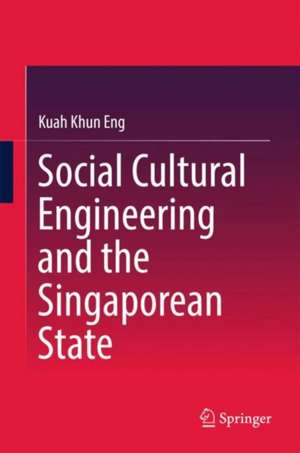Social Cultural Engineering and the Singaporean State
Autor Khun Eng Kuahen Limba Engleză Hardback – 19 feb 2018
This book, a collection of previously published articles, focuses on the role of the Singaporean State in social cultural engineering. It deals with the relationship between the Singaporean state and local agencies and how the latter negotiated with the state to establish an acceptable framework for social cultural engineering to proceed. The book also highlights the tensions and conflicts that occurred during this process. The various chapters examine how the Singaporean state used polices and regulatory control to conserve and maintain ethno-cultural and ethno-religious landscapes, develop a moral education system and how the treatment of women and its morality came into alignment with the values that the state espoused upon from the 1980s through the 1990s.
| Toate formatele și edițiile | Preț | Express |
|---|---|---|
| Paperback (1) | 381.21 lei 6-8 săpt. | |
| Springer Nature Singapore – 23 dec 2018 | 381.21 lei 6-8 săpt. | |
| Hardback (1) | 388.52 lei 6-8 săpt. | |
| Springer Nature Singapore – 19 feb 2018 | 388.52 lei 6-8 săpt. |
Preț: 388.52 lei
Nou
Puncte Express: 583
Preț estimativ în valută:
74.35€ • 76.81$ • 61.88£
74.35€ • 76.81$ • 61.88£
Carte tipărită la comandă
Livrare economică 25 martie-08 aprilie
Preluare comenzi: 021 569.72.76
Specificații
ISBN-13: 9789811069703
ISBN-10: 9811069700
Pagini: 162
Ilustrații: XIII, 160 p. 17 illus., 9 illus. in color.
Dimensiuni: 155 x 235 mm
Greutate: 0.43 kg
Ediția:1st ed. 2018
Editura: Springer Nature Singapore
Colecția Springer
Locul publicării:Singapore, Singapore
ISBN-10: 9811069700
Pagini: 162
Ilustrații: XIII, 160 p. 17 illus., 9 illus. in color.
Dimensiuni: 155 x 235 mm
Greutate: 0.43 kg
Ediția:1st ed. 2018
Editura: Springer Nature Singapore
Colecția Springer
Locul publicării:Singapore, Singapore
Cuprins
1 Introduction.- 2 State, Conservation and Ethnicisation of Little India in Singapore.- 3 Bugis Street in Singapore: Development, Conservation and the Reinvention of Cultural Landscape.- 4 Maintaining Ethno-Religious Harmony in Singapore.- 5 Buddhism, Moral Education and Nation Building in Singapore.- 6 Confucian Ideology and Social Engineering in Singapore.- 7 A Strategic Partnership between Buddhism and the State: Delivering Welfare Services in Singapore.- 8 Inventing a Moral Crisis and the Singapore State.- 9 Conclusion.
Notă biografică
Kuah Khun Eng is currently visiting the Division of Sociology at the School of Social Sciences, Nanyang Technological University, Singapore. Prior to this, she was Professor of Anthropology and Head of the School of Arts and Social Sciences at Monash University Malaysia and Associate Professor at the University of Hong Kong. She was also a visiting scholar and coordinate research scholar of Harvard-Yenching Institute at Havard University and a visiting professor at University of Paris Diderot. Her research focus is on Chinese Diaspora-Mainland Connections and Religion and Politics, focusing on Buddhism, politics and philanthropy, gender and social movements. She conducts her research primarily in Singapore, Hong Kong, Taiwan and China. She is the author of 2 books, editor/co-editor of 9 edited books, guest editor/co-editor of 4 journal issues and numerous journal articles and book chapters.
Textul de pe ultima copertă
This book, a collection of previously published articles, focuses on the role of the Singaporean State in social cultural engineering. It deals with the relationship between the Singaporean state and local agencies and how the latter negotiated with the state to establish an acceptable framework for social cultural engineering to proceed. The book also highlights the tensions and conflicts that occurred during this process. The various chapters examine how the Singaporean state used polices and regulatory control to conserve and maintain ethno-cultural and ethno-religious landscapes, develop a moral education system and how the treatment of women and its morality came into alignment with the values that the state espoused upon from the 1980s through the 1990s.
Caracteristici
Examines the role of the Singapore state in social cultural engineering and the formation of an identity from the socio-cultural and political anthropology perspectives Challenges ideas that an authoritarian state does not lead to development, especially cultural development Builds on the conceptual idea of state-society interaction and relationship
